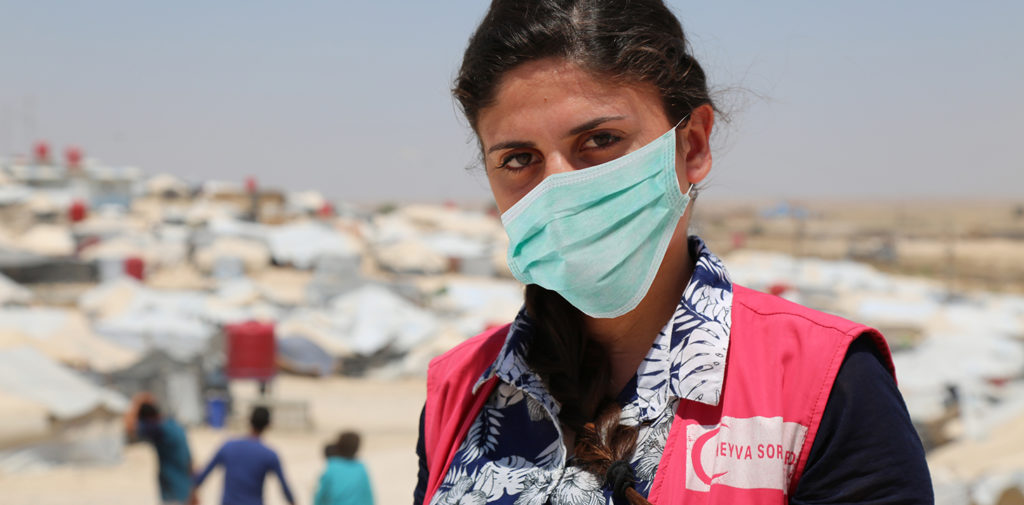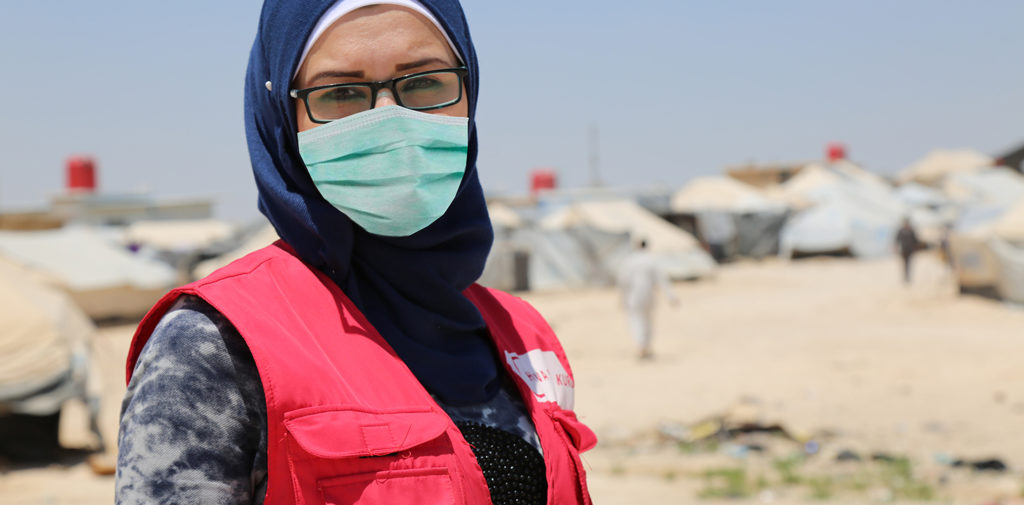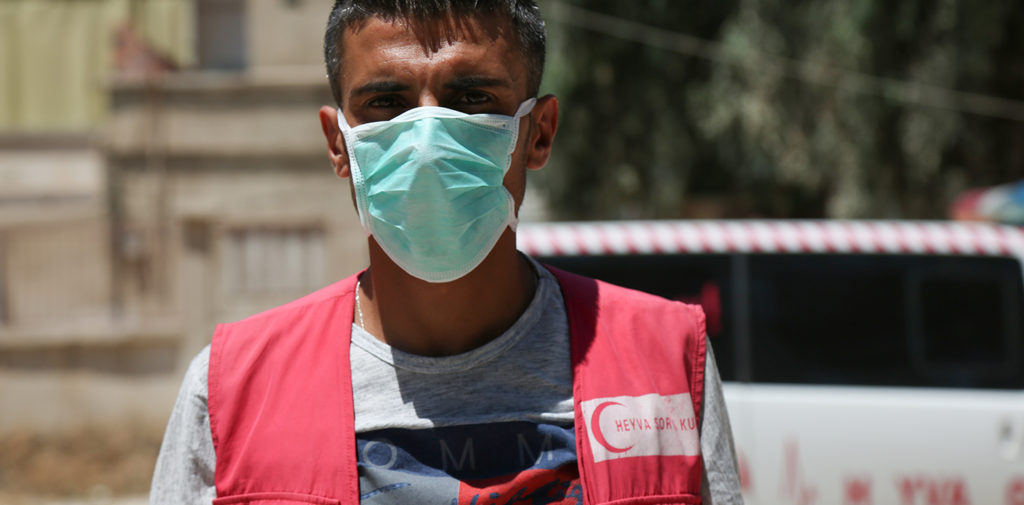Syria. “Our duty to help”
In the Al Hol camp, northeast Syria, we are now facing another humanitarian crisis. In just 4 months between December 2018 and March 2019, 64,000 people arrived here – most of them women and children – in search of shelter. The camp’s inhabitants previously numbered only 9,000.
We always work in collaboration with the Kurdish Red Crescent, and we are investing in men and women Community Health Workers (CHWs), people who live in the camp who can act as the first point of contact for available healthcare services.
People like Haleen, Israa and Jiwan, who make a vital contribution to our work. You can make a contribution too if you want to help make a difference. Find out how to make a donation here.
Find out their stories.
***

Haleen is 24 years old, lives in Syria and studies Civil Engineering. She had just started university when she first saw hundreds of Iraqi refugees arriving in her country. She could have just kept on with herstudies but instead she decided to try and help the refugees. It was the summer of 2016 and the Al Hol refugee camp was equipped to house the Iraqi refugees fleeing Daesh. That year alone,9,000 people arrived. But that was only the beginning.
Haleen is now in her third year of university and Al Hol has become hell on earth. In a 4-month period between late 2018 and early 2019, 64,000 more people came seeking shelter from the fight for liberation from Daesh in Syria. Meanwhile Haleen became a member of one our Community Health Workers (CHW), men and women social workers who live in the camp and act as our first point of reference for the health services which are available to camp-dwellers.
This is not always an easy task as “the new arrivals are often in a bad state and not always open to assistance. Especially the people who are still traumatized by their experiences”, Haleen explains. She is especially proud of her work with a recent typhoid prevention campaign during the first mass migration of women and children towards Al Hol.
“There were so many sick people, we had to work to avoid an epidemic” she says. “Doctors from the Kurdish Red Crescent provided support and encouragement, and we always did our very best, and we aspire to do even more to help in the future”.

Israa is a 32-year-old, Syrian mother of three. She has a degree in English and was working as a teacher until 2009, when her life changed, together with her country: war broke out in Syria and is still raging today, 8 years later. Israa decided to sign up to work with the Kurdish Red Crescent to help her people. She says she wanted to do it “out of love for people, and my desire to help them“, since war doesn’t differentiate. Now Israa is one of our Community Health Workers, based in Northeast Syria. They go into areas where there are no hospitals, reaching distant and isolated communities, even summoning up enough courage and determination to go into the country’s biggest refugee camp: Al Hol, where a new humanitarian crisis is underway.
As a mother herself, Israa decided she wanted to focus on helping other mothers and began working on a campaign to encourage breast-feeding – in an effort to reduce dependency on powdered milk, which is hard to find in wartime – while also helping new mothers in their new and complex adventure. “It was very important for me“, she explains, “because breast-feeding helps children to grow up healthy, thanks to the antibodies the milk contains which protect them from illness. If you take care of a woman, you are effectively taking care of her whole family. If she is healthy, her children will be healthy too“, she explains. And that is why, thanks to Israa’s efforts, even women who are forced to give birth in a refugee camp tent can experience at least part of that special moment which is childbirth.
“I take care of them from the very first day of breastfeeding until the baby reaches 6 months. As a mother myself, the women find it easier to trust me and follow my advice“. Being accepted is not always easy, and a key part of the health workers’ task is to build trust. And that is, after all, the foundation of their work: finding a way to be accepted into the communities they want to help, because the right to health can be the first step towards reclaiming a normal life.
Israa and her team are not only accepted but also highly appreciated. So much so that “the children always want to take selfies with us” Israa tells us with a big smile, before climbing back into the ambulance and heading off.

Jiwan is 30 years old and lives in Syria. He was studying Science and Technology at university until war broke out. Then, in 2016 he encountered the Kurdish Red Crescent and decided to start working with them. “There were thousands of Iraqis fleeing a similar war into our country. They were all talking about this enormous refugee camp called Al Hol…. I felt like I needed to find a way to help, to help mitigate the tragic conditions of those people“, Jiwan recalls. So, he first started working as a volunteer, then became a Community Health Worker until eventually becoming Coordinator of his team, which ensures vital services and works on prevention campaigns in the Al Hol camp.
“I worked on various campaigns, such as for the prevention of typhoid and other diseases, but mainly I remember the first phase of our intervention: we had to do do a census of all the chronically ill people in the camp who were in need of medicines for their on-going treatment. It might not seem much, but ensuring their access to treatment and getting it to their tents, was one of our most important acheivements“, adds Jiwan.
He also describes the support he has given since 2016 to hundreds of unaccompanied children, disabled people and young single mothers: “When you first arrive in a massive refugee camp like this, it is hard to understand your rights, or even which healthcare services are available. Providing answers to these questions was the best way to help“, he explains.
Today, as he walks through the camp, people greet him and bless the Kurdish Red Crescent for what they do. “They are so happy to see us! They are wishing us long life” he says. “And we just do our best to help, every single day“.
***
It is important to make a contribution now to ensure free treatment for everyone. Donate now >>
L’intervento nel campo di Al Hol è implementato nell’ambito del progetto “Fourniture de soins de santé primaires et de services d’urgence aux réfugiés iraquiens et aux personnes déplacées à l’intérieur du camp d’Al Hol (2019-009)”.
